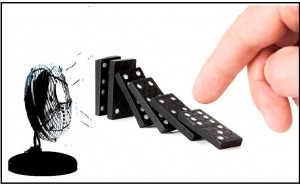Should You Be a Deal Moderator, or Mediator?

To understand the difference, don’t think “labor dispute mediator” or “presidential debate moderator”. The “moderator-mediator” distinction, as used in science and statistics, with applicability to business, is a somewhat different tool and more complex conceptual beast.
In the sciences, including the social sciences, the distinction between “moderators” and “mediators ” is important, but drawn in different, elaborate and often conflicting ways. But, for the purpose of usefully applying these concepts to your role in “making things happen”, an intuitively appealing interpretation with illustrations relevant to workplace and workaday situations may suffice to add another useful tool to your work and life toolbox.
Moderator Breeze, Mediating Nudge
First, to get the semi-technical unpleasantness out of the way, here is one among various conceptions of “moderator” and “mediator”—this one from the Department of Psychology, University of Wisconsin (chosen for its relative “simplicity” among those “out there”):
“…a moderator variable is one that influences the strength of a relationship between two other variables, and a mediator variable is one that explains the relationship between the two other variables.”
To get a basic feel for this version of the moderator-mediator distinction, consider listening to music: If you are listening to a song on your iPod, the volume control and settings above zero will moderate the relationship between the signal from the device and the sound in your head, i.e., make it louder or softer.
On the other hand, the on-off button and use of the “select” function will mediate it, i.e., make it possible/impossible to hear the song at all (Yes, turning the volume to zero complicates things, but let’s not go there).
“Explains”, as used in the definition given above, seems somewhat misleading, since mediators, in this scientific sense and on this interpretation of them, seem to be indispensable links or “black boxes” that connect two other things, commonly as cause and effect, or all-or-none input and output.
Think of a mediator as the initial nudge and the middle domino between two other dominoes: without both of these the first domino will not topple the third. (If the nudge and the middle domino are regarded as separate mediators, each becomes, at most, only a necessary condition for the toppling, not a sufficient condition unless combined as one mediator.)
Hence, the nudge and the middle domino together “explain” why or how the first makes the third fall.
In contrast, a moderating variable in the domino scenario might be a moderate wind from a fan blowing against the (or, at the other extreme, in the same) direction of toppling. The dominoes will still topple, but in a way moderated, e.g., slowed or skewed (or accelerated), by the fan’s wind.
If you insist on a very specific scientific illustration, here’s a medical illustration, also from the cited University of Wisconsin site and also relatively “simple”: “As an example, let’s consider the relation between social class (SES) and frequency of breast self-exams (BSE). Age might be a moderator variable, in that the relation between SES and BSE could be stronger for older women and less strong or nonexistent for younger women. Education might be a mediator variable in that it explains why there is a relation between SES and BSE. When you remove the effect of education, the relation between SES and BSE disappears.”
(So, change the age, and the strength of the relationship changes, without being eliminated, just as the fan’s wind changes, but does not eliminate, the toppling of the dominoes; but remove the effect of education-induced awareness, and, apparently, the relationship between socioeconomic status and self-exams vanishes, just as the toppling does if the nudge and middle domino are removed.)
Mediating vs. Moderating Domino Deals and Loops
Now apply this distinction to the art and science of The Deal: You are given the task of getting Mr. A and Mr. B to sign an employment contract or to merge their businesses. Your vanity may make you hope that your role is (seen as) that of mediator—without you, there is no deal; you are the deal-maker, deal-breaker king.
Your conceit may lead you think that’s exactly what you are, or your inclination to be cunning may make you try to convince others of the same.
By the same token, your hubris may get you into deep trouble, if you convince everybody else, including your boss, that you are indeed the deal mediator, rather than just a moderator, just before the deal falls apart or ends up bitterly disappointing Mr. A and/or Mr. B.
(Of course, if you are a truly awful moderator, that could wreck the deal—in which case you become the mediator of a failed deal, i.e., you are the cause of the deal’s falling through.)
So, modesty and caution recommend that whenever you are the man or woman in the middle, and seemingly the second domino, you think twice before taking on the mantle and scepter of the mediator (variable).
Instead, it may be smarter to play or portray your role as that of a capable moderator: You won’t be in the loop to tie its ends together and sew up the deal. No, your job will be to make sure the loop has no snags, knots, frayed ends or nerves, and no unraveling of its “strands”.
In this instance, you may, as a moderator, affect the speed of the deal or even its scope and make it go more smoothly. But you are not the middle domino.
You are the wind of the fan.

